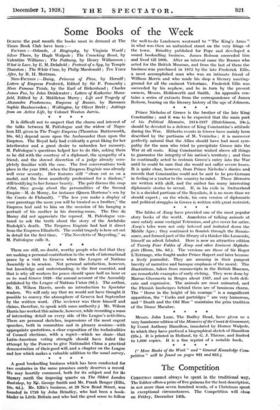It is difficult not to suspect that the charm and
interest of the talks between M. Paleologue and the widow of Napo- leon III. given in The Tragic Empress (Thornton Butterworth, 10s. &I.) depend more upon the Ambassador than upon the Empress. The Royal lady had evidently a great liking for her interlocutor and a great desire to unburden her memory. M. Paleologue's questions helped her to do this, asking them as he did with the courtesy of a diplomat, the sympathy of a friend, and the shrewd discretion of a judge already com- pletely familiar with the case. The first conversations took place in the year 1901, when the Empress Eugenie was already well over seventy. Her features still " clean cut as on a medal, and the brow manifestly predestined for a diadem," still testifying to her former beauty. The pair discuss the coup d'etat, they gossip about the personalities of the Second Empire—M. de Morny, for instance (Queen Hortense's son by the Comte de Flahault). " The less you make a display of your parentage the more you will be treated as a brother," the Empress had said to him on the occasion of his hanging a portrait of his mother in his drawing-room. The Duc de Morny did not appreciate the reproof. M. Paleologue ven- tured to ask the truth about the story of the Archduke Rudolph's death. The Empress Eugenie had had it direct from the Empress Elizabeth. The sordid tragedy is here set out in detail for the first time. " The Novelette of Mayerling," M. Paleologue calls it.
* * * *








































 Previous page
Previous page